
The Tsar Who Saved (most) of the Jews
The baby who would become the Bulgarian Tsar Boris III was born on 30 January 1894. The biggest scandal around his infancy centered around the fact that his father, Ferdinand I, defying the angry wishes of Boris’s mother, converted the infant from the Catholic to the Bulgarian Orthodox Church. The switch horrified the Catholic Habsburg side of the family and resulted in Ferdinand’s excommunication. To calm the storm, Ferdinand had to baptize all his remaining children Catholic.
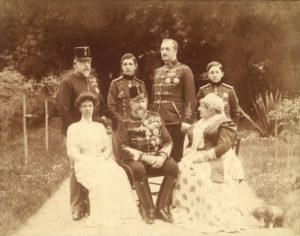
Bulgaria under the Saxe-Coburg-Gothas was ultimately governed by the Tarnovo Constitution of 1879, which made Bulgaria a constitutional monarchy. It was remarkably liberal for it’s time, with an aristocratically-eyebrow- raising article 61: Nobody in the Principality of Bulgaria is permitted to buy or sell human beings. Each and every enslaved human being, regardless of his/her gender, faith, or ethnicity, is declared free at the moment he/she sets foot in our own land.
It also promulgated equality and prohibited promotion of artistocratic titles, prohibited censorship, made property rights sacrosanct, enshrined freedom of association, and prohibited punishment of citizens whose case had not been tried by a court.
Intentions being greater than actions, there were several times that various portions of the constitution were suspended. Even so, until it was ditched in favor of the more socialist-oriented Dimitrov Constitution, Bulgarian monarchs took the Tarnovo Constitution seriously.
Boris, as required by all males in Bulgaria, served in the Bulgarian military. Although he probably could have gotten around the requirement by fulfilling staff duty far from any danger while still being entitled to wear an ornate uniform with lots of bling, he served during the Balkan Wars, and in World War I on the Macedonian Front and in Romania.
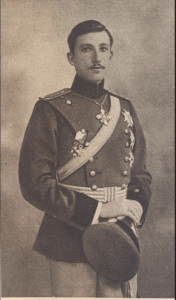
Bulgarian troops were vicious against their Serb enemies in World War I. The Serbs had been the Bulgarians’ enemies and the victors of the Balkan Wars. Numerous pictures of smiling Bulgarians standing proudly next to piles of Serbian skulls were circulated, and it came home to roost when the final treaties of the Great War were drawn up. Bulgaria was to be humiliated. Under the 1919 Treaty of Neuilly, Bulgaria was forced to cede territories, reduce their military, and pay crippling reparations. As the architect of Bulgaria’s string of losses, Tsar Ferdinand abdicated in favor of his son, who became Boris III.
Boris was not an immediate success. First he was the target of a string of assassination attempts and a short border war with Greece (which may have the best war-name in history- The War of the Stray Dog). After he handled those situations, on 19 May 1934 the Zveno military organization reduced him to a puppet Tsar after a coup. It took one year, but in 1935 Boris mounted a successful counter-coup and from them on ruled “the King’s Government” as a defacto absolute monarch.
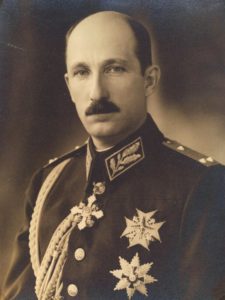
“As a ruler Boris is competent; as a citizen exemplary; as a personality, inspiring,” wrote Rueben H. Markham of the Christian Science Monitor. Indeed, most Bulgarians view the reign of Boris until the advent of the alliance with Nazi Germany as a golden age for Bulgaria.
When World War II broke out, Bulgaria briefly stayed neutral. But Hitler could be persuasive when he wanted to be, and offering a nation still licking its WWI wounds the chance to recover lost territories was a siren call that could not be denied. It didn’t hurt that two of the most prominent government ministers in Bulgaria, the Prime Minister Bogdan Filov and the Interior Minister Peter Gabrovski, were ardent Nazi sympathizers.
As a consequence of joining Nazi Germany and being given back territories, Bulgaria was required to institute Nuremburg-style laws within the country. Almost immediately the Law for the Protection of the Nation went into effect. The law was overarching and draconian: Jews were banned from nationalizing into Bulgarian citizenship, they were forbidden to have names with Bulgarian patronymic suffixes, they were banned from public office and civil service, they were not allowed to move residences and a committee was established to create Jewish neighborhoods, and Jews were either banned outright or subject to strict quotas in several occupations. Jewish identity cards were issued in a different color, and eventually the infamous yellow star requirement was instituted.
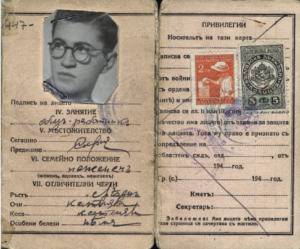
The law did not pass without comment, however. Many Bulgarian intellectuals took up the cause of protecting Bulgarian Jews, and even common Bulgarians protested to the government and to the Tsar himself.
“Poor Bulgaria! We are seven million people, yet we so fear the treachery of 45,000 Jews who hold no positions of responsibility at the national level that we need to pass exceptional laws to protect ourselves from them.” —a letter to the Parliament from former government ministers
Tsar Boris III was not proving to be the ally Hitler had hoped for. Sure, they were occupying vital areas, and there was Balkan blood-feud history between Serbia and Bulgaria. But Tsar Boris refused to declare war on the Soviet Union, and he refused to allow Bulgarian troops to fight on the Eastern Front. He did declare war on the US and UK, but that was as far as it went. Bulgarian troops weren’t going to fight on the Western Front, either.
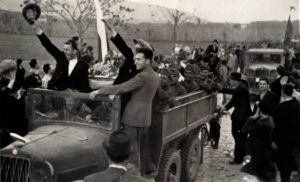
And to add insult to injury, Tsar Boris was refusing to turn over his Jews. He signed the Law for the Protection of the Nation, and Jews were definitely being deprived of property and forced into hard labor on public works projects like roads. But the Fuhrer wanted the Jews eliminated, and Boris was fighting him on that point.
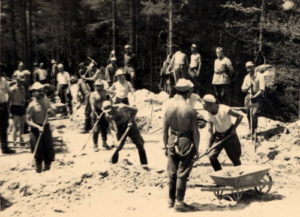
Finally, on 22 February 1943, an agreement was signed by the Bulgarian government and Nazi Germany to deport 20,000 Jews from Bulgaria proper, along with the Jews in Macedonia and Vardar, in March 1943. Preparations were made. Rickety railcars began to gather at the town of Kyustendil. Jews were told to report to the town on 9 March, and they were scheduled to leave on 10 March.
As soon as the plans were circulated, Bulgaria exploded. The loudest and most urgent cries came from the Bishop Metropolitan of the Bulgarian Orthodox Church, Kiril, who used the network of churches, priests, and lay members to urge all Bulgarians to stop the upcoming transportation from happening. Kiril and farmers throughout the nation threatened to lie down on the railroad tracks to stop the deportations from happening. Bakers hid Jews in their ovens and priests printed false baptismal certificates by the thousands.
“Whether it is one or 1000 Jews I assist, the Nazis can only shoot me once,” one priest said.
The Bulgarian Orthodox Church was speaking with one voice on the matter. “If we, the church, allow the Jews to be deported, we will betray our most sacred obligation,” said Reverend Boris Haralampiev.
The mass action by the Bulgarian people worked – not one Jew was deported from the area of Bulgaria proper during World War II. Unfortunately, the entire Jewish population of the occupied areas of Macedonia and the Vardar were allowed to be deported that same month – and over 11,000 people under Bulgarian control lost their lives in the concentration camps of Poland.
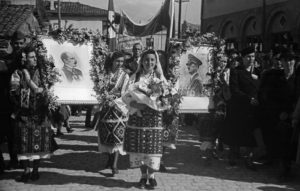
Tsar Boris III was immediately ordered to an audience with Hitler to explain himself, where he met the Fuhrer head-on with a refusal to deport, claiming the Jewish men were needed for hard labor projects within Bulgarian borders. He would not budge from his claims, nor would he cede to demands that he send Bulgarians to fight on the Eastern Front. On 5 April the German Legation in Sofia sent the Nazi government a message, “The Minister of the Interior has received instructions from the highest place to stop the planned deportation of Jews from the old borders of Bulgaria.” The “highest place” referred to was the Tsar himself.
The problem was that, under the Law for the Protection of the Nation, the Bulgarian government had no standing with which to address German deportation of non-Bulgarian Jews. Unbeknownst to most, the Tsar was working with an old friend, the Apostolic Delegate Angelo Roncalli (the future Pope John XXIII) to try to get foreign Jews out of Bulgaria and into Palestine. An early plan to utilize Swiss documents and resources was blocked by Anthony Eden. The plan switched gears, and travel visas began to come through the Papal Nuncio in Istanbul. The journey to Palestine was twisting and torturous, but it was arranged for some.
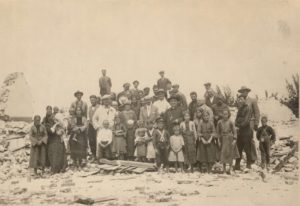
The Nazis again attempted a deportation of 48.000 Bulgarian Jews in May 1943, and again the Church and Bulgarian people reacted and refused to allow their removal. The Tsar publicly joined their protests.
Although no official written record of the Tsar’s actions in regards to Bulgarian Jews exists, there is a diary account from Roncalli which recounts a conversation in which he begs for mercy for the Jews. According to his notations, the Tsar had agreed with him.
On 19 August 1943, the Tsar was summoned before Hitler one final time, and again he refused demands for Jewish deportation, still stating that Jewish males were needed for hard labor projects, as they were being forced to work in deplorable conditions on public works projects throughout the country. Hitler could not deny that the works were taking place, that Nuremberg-style laws had been introduced and were being enforced, and that Jews were not being treated well within Bulgaria. The only one of the Nazi orders being refused about Bulgarian Jews was their deportation. Hitler was furious, nonetheless.
“Hitler went into a rage when I refused his demands. Screaming like a mad man, he attacked me and Bulgaria in a torrent of accusations and threats. It was horrible. But I did not surrender one inch!” —Tsar Boris III
Boris returned to Bulgaria from his meeting, but within nine days he was dead – officially of heart failure. His attending German physicians had a different story, however. They believed, based on the symptom evidence and the lack of earlier heart issues, that the Tsar had been poisoned with the same slow-acting toxin that had been found two years earlier in the murdered Greek Prime Minister.
Tsar Boris III’s legacy in regards to Bulgarian Jews is difficult to decipher. It is unchallenged that the nearly 50,000 strong community almost completely survived the war and the Holocaust. And for this reason, in 1994, the Jewish National Fund posthumously awarded the Tsar their Legion of Honor medal. He was the first non-Jew to receive one of the organizations highest honors.
On the other hand, the Tsar willingly handed over the 11,000 plus Jews in Macedonia and the Vardar to certain death. He also acquiesced in the deprivation of property and forced hard labor of Jewish males.
It was for these reasons that the“Bulgarian Forest” monument in Israel was removed in 2003 and replaced by a monument to the murdered Jews of Macedonia, Thrace, and Pirot.
Bulgaria had not been free of anti-semitism before the war by any means. There was no special love or protection in the country for the relatively small community within its borders. And yet, the nation acted together to protect them from the certain death of transportation. It’s possible that, in order to keep an image the Nazis would be comfortable with, other harsh actions had to be taken. Certainly those in the Bulgarian government who were sympathetic to the Nazi anti-semitism had to be appeased.
The truth is that it is just too late to know. When the Soviets flooded into Bulgaria at the end of the war, the royal family was exiled posthaste (which was certainly a better alternative than what the Soviets had done to their own royal family). Records were destroyed and the regents who had ruled for the six-year-old Tsar Simeon were all executed. The refusal of the Bulgarian people to allow their Jews to be deported was not a story the Soviets allowed to be told, and most people didn’t know it had happened until after 1989. By then there was no trace of reasoning behind the Tsar’s actions.
And there was no trace of the Tsar’s body, either.
Moved several times during communist rule, Tsar Boris III’s heart was finally discovered and reburied at Rila Monastery, next to a hand carved wooden cross from Osoi in Debar District with the epitaph, “To its Tsar Liberator Boris III, from grateful Macedonia.”
- July 23, 2020
- Bulgaria
